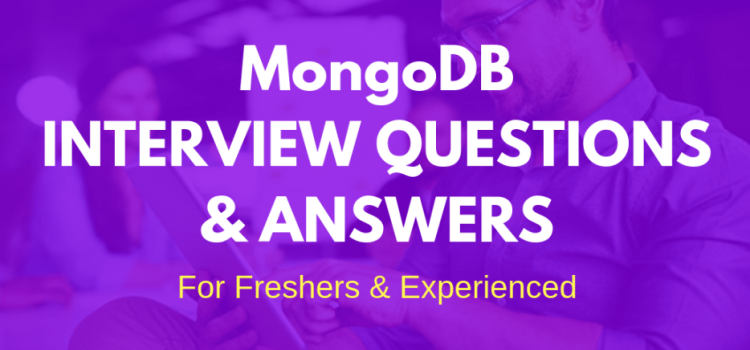How to Best Prepare Yourself with MongoDB Interview Questions

For MongoDB career choosers, this article is a must go through as it will refer some of the best MongoDB interview questions to practice combined with other crucial factors associated with this niche. With the increasing switch of businesses from a traditional relational database to MongoDB, we can clearly measure the ongoing demand of this document-oriented, cross-platform database program. Before we explore the technical interview questions best supporting this niche, let's know the reasons to learn MongoDB in 2019 and the list of features that you must conquer to master MongoDB while preparing best for the next interview.
So, why should you learn MongoDB?
First of all the reasons, MongoDB is a NoSQL (not only SQL) database, which means here data will be placed accurately in tables, and the data schema will be designed up to the mark before the database is built. Apart from that MongoDB has plenty more developer-friendly features such as BSON format, aggregation framework, sharding, ad-hoc query, replication, indexing capped collection, MongoDB Management Service (MMS), etc. which make it a superior and rewarding choice to start your career.
Now, what are the features you must learn to land on the best MongoDB development jobs?
Defining and mastering the features of MongoDB can be extremely helpful to go with a number of MongoDB interview questions and answers. This is the list of MongoDB features you must master.
No-Schema Database
Every collection in MongoDB holds various documents. Without schema, the database can have multiple fields, size, and content when compared to another document in the collection. This is the reason why MongoDB offers flexibility while dealing with databases.
Ad-Hoc Query
MongoDB offers ad-hoc support, which gets updated in real time. This leads to better performance for users. MongoDB developers need to practice the ad-hoc query part so that they can perform better in the interview.
Aggregation
Aggregation is a crucial part of many MongoDB interview questions. Efficient usability is the primary benefit of aggregation. With the aggregation framework, we can batch process data and obtain a single result even after performing various operations on the group data.
Indexing
Indexing is a crucial part of MongoDB, which improves the performance of search queries for the developers. MongoDB developers can index any field indexed with both primary and secondary indices. The indexing feature also makes the query searches faster. So, developers definitely should learn and master this for better interview execution.
Replication
MongoDB uses replication for redundancy. It distributes data to multiple machines. The replication can have primary nodes and their replica sets. Due to the availability of the secondary node, for instance, during the unavailability of the primary node, developers can save time during maintenance and promotes smooth operation.
Sharding
MongoDB's sharding concept helps to deal with more massive datasets. Sharding distributes the problematic data to multiple instances present in MongoDB. Shards are implemented by clusters.
Here are some most frequently asked MongoDB interview questions for you to practice.
- How to list all indexes in MongoDB?
- What are the uses of MongoDB?
- Why it is called MongoDB?
- What is the difference between Mysql and MongoDB?
- What is the difference between MongoDB and SQL?
- In MongoDB, what is CRUD?
- How to create a collection in MongoDB?
- How to create an index in MongoDB?
- What is a replica set in MongoDB?
For expert suggested answers of these MongoDB technical interview questions, check our website.
Continuous practice with interview questions and implementation on the self project can help candidates to easily crack their next MongoDB interview. Also, do check our website. Best Interview Question for more interview question-related help.
